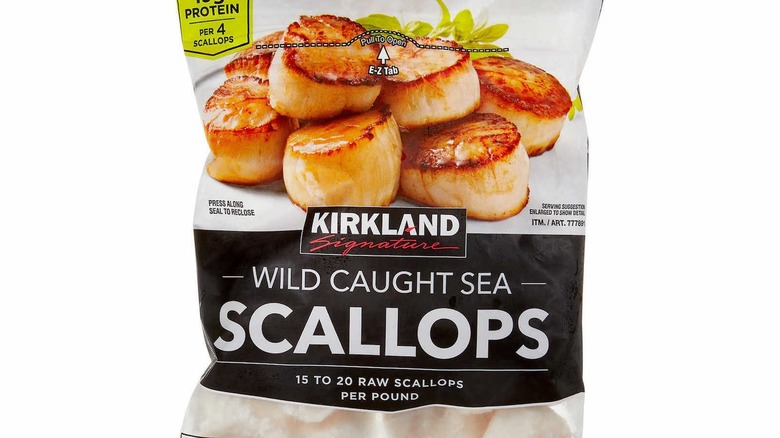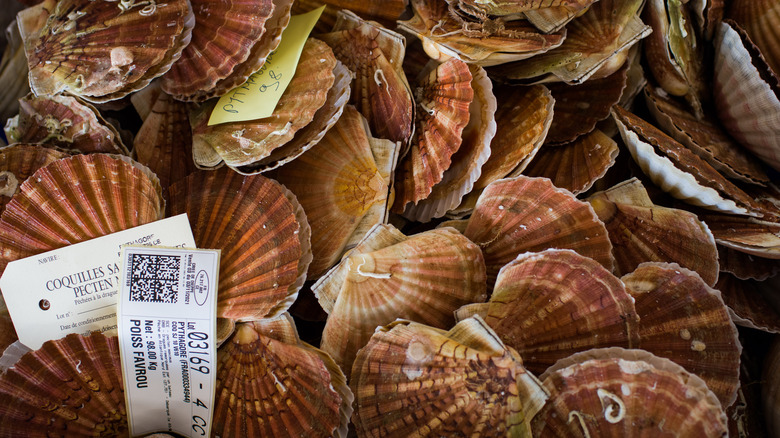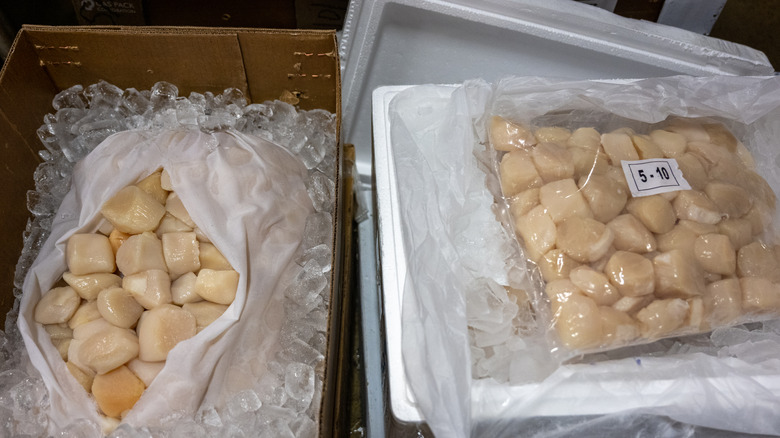Costco's Raw Sea Scallops Are A Total Steal For Seafood Fans
Chefs and foodies alike love shopping at Costco for the high quality of their house-brand products, which also happen to be astonishingly cheap. Their olive oil is legendary (even Samin Nosrat of "Salt, Fat, Acid, Heat" fame is a fan), their Rao's Homemade Marinara sauce regularly scores big on comparative taste tests, and Kirkland's single-serve hummus cups get packed into millions of lunches every day.
Costco has great deals on more than just packaged groceries, however. Their fresh meat and seafood sections are also filled with some great finds, and one of the best buys is their Kirkland Signature Wild Caught Sea Scallops. Sold at around $22 per pound depending on your location, these flash-frozen scallops are a major steal because of their high quality, and the price can't be matched at other grocery stores or fish markets. Plus, one two-pound bag is perfect for making a tray of appetizers for your next dinner party, or for treating yourself — guilt-free — to a batch or two of Coquille St. Jacques.
They use high quality bivalves
What sets Costco's products apart from other big box and warehouse stores is that their store-brand products are reliably good. This is because the company spends a lot of time being choosy about the products that receive their signature label, and they curate that list of products to keep the number of items in the store down to around 4,000 — a fraction of the number usually sold at traditional grocery stores. If customers don't respond to a product, it gets discontinued to make way for a better-selling item, so the competition for shelf space is fierce.
The Kirkland sea scallops are on brand with Costco's commitment to quality for a couple of reasons. First, they are Grade A, which according to the National Oceanic and Atmospheric Administration (NOAA), means that they have good odor and color, and have an excellent appearance with no obvious blemishes or defects.
Second, the scallops are wild-caught, which NOAA says explains is a sustainable seafood choice because scallops aren't overfished. Plus, the scallops are responsibly caught thanks to regulations that protect their habitat and prevent bycatch. Farmed scallops are cheaper, but they also tend to have more contaminants and diseases, according to Colorado State University. Farmed fish are also often given antibiotics to prevent disease in their cramped quarters.
The scallops are all natural
Probably the biggest selling point for Costco's scallops is that they are considered dry scallops. (To wit, Costco sells both varieties, but the fact that dry are available to purchase at Costco locations is a major selling point for seafood lovers). When scallops are harvested, some of them are exposed to a substance called STPP, or sodium tripolyphosphate (these are called wet scallops). This is done to make sure that the scallops are moist even after they've been frozen. But while this makes the defrosted scallops look glossy, it also makes them difficult to sear because extra moisture continues to leak out while you're cooking, disrupting the searing process, according to Cook's Illustrated. This also gives the cooked scallops a wet, rubbery, dull taste and texture. Plus, STPP is an artificial preservative, so opting for dry scallops instead of wet scallops is recommended. Luckily, Costco's scallops are all-natural, aka dry.
In addition to messing with the taste and texture of the scallops, STPP also adds water weight to scallops (hence the term wet), so you actually get less scallop meat for your dollar. And there's just no sense in paying more for lower-quality seafood, which already tends to be pretty expensive.
Speaking of price, Costco's scallops come in around $4 a pound cheaper than Whole Foods and are comparatively less expensive than other grocery store prices. Plus, with Costco's bag o' scallops, you always know you're getting wild-caught, grade A, dry shellfish, rather than trying to guess where they came from — or if they're even real — which is unfortunately pretty common according to the National Sanitation Foundation. You always know what you're getting with Kirkland scallops!


